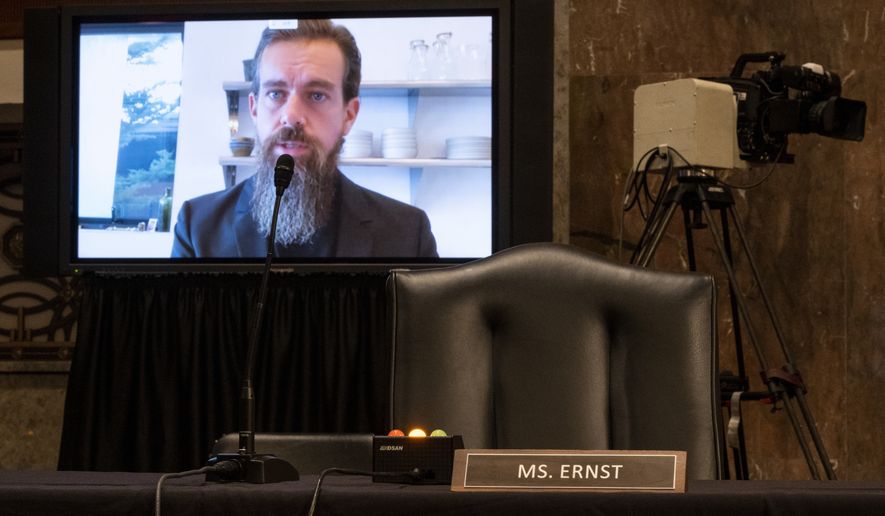Twitter CEO Jack Dorsey admitted to senators Tuesday that his company made “mistakes” with a too-quick trigger finger when it suspended accounts from The New York Post and Homeland Security’s border chief in the days before the election.
Mr. Dorsey’s olive branch may not be enough to stave off a legislative reckoning, as he and Facebook CEO Mark Zuckerberg were pummeled by both Republicans and Democrats who said the companies are failing in the role of neutral players when it comes to political information.
Democrats on the Senate Judiciary Committee complained that Facebook was slow to take down pages from far-right militia groups or others issuing calls to violence.
Republicans said that Twitter seems to fact-check or suspend conservative accounts and viewpoints far more than it does liberal ones.
Sen. Lindsey Graham, South Carolina Republican and chair of the committee, said he fears the platforms have become addictive, comparing it to using tobacco.
Those in both parties said the companies need to strike a better balance — and warned Congress may get involved, revisiting Section 230 of the Communications Decency Act, which protects social media companies from being held responsible for the content published by users on their platforms.
“At the same time that Big Tech exercises massive power, it also enjoys massive corporate welfare, through the effect of Section 230, a special immunity from liability that nobody else gets,” Sen. Ted Cruz told the executives, who testified remotely to the Senate Judiciary Committee. “Congress has given Big Tech, in effect, a subsidy while they’ve become some of the wealthiest corporations on the face of the planet.”
Tuesday’s hearing was scheduled after several high-profile actions in the run-up to the election, including Twitter’s suspension of The New York Post’s account over its reporting on a laptop purportedly belonging to Hunter Biden that contained emails suggesting he and his father, Joseph R. Biden, now the presumptive president-elect, benefited from shady foreign business deals.
Twitter also suspended the account of acting U.S. Customs and Border Protection Commissioner Mark Morgan for saying the border wall stopped criminals. That tweet was labeled hateful.
Mr. Dorsey said both moves were goofs. The Post story was blocked under an old policy meant to stop the use of hacked materials and exposed a gap in Twitter’s ability to undo bad decisions.
As for the wall tweet, Mr. Dorsey said Mr. Morgan was a victim of “heightened awareness around government accounts during this time.”
“That was a mistake,” he said.
Sen. Richard Blumenthal, Connecticut Democrat, said he thought Facebook had routinely capitulated to conservatives and supporters of President Trump, who he said has tried to bully social media companies.
“They’re, in effect, working the refs and they’re winning,” Mr. Blumenthal said.
He said the questions are still very much alive, given the January runoff for two Senate seats in Georgia that will decide control of the chamber.
“I’m concerned that both of your companies are in fact backsliding or retrenching, that you are failing to take action against dangerous disinformation, exactly the same kind of voter suppression tactic that existed in the last election, and that you are in fact reducing content modification,” the senator said.
The CEOs said they will keep in place the same policies they used in recent weeks to govern content.
More broadly, they said, the solutions involve transparency over why decisions are made. In many cases, it’s an algorithm that’s flagging content.
Mr. Zuckerberg said 94% of hate speech posts on Facebook are taken down before anyone even reports the items, thanks to Facebook’s artificial intelligence systems or the company’s own content reviewers. A few years ago it was just 20%, he said.
A larger issue in this election, though, has been social media’s attempts to referee political statements and claims about voting.
Facebook says it relies on outside fact-checkers such as The Associated Press and USA Today to set standards for what gets labeled as misleading or erroneous.
Twitter, meanwhile, has been slapping labels on posts by President Trump and others complaining of voting irregularities or fraud in the election.
Mr. Cruz demanded to know whether Mr. Dorsey thought fraud existed. The CEO said he wasn’t sure, and under further questioning said he isn’t an expert.
“Well, why then is Twitter putting purported warnings on virtually any statement about voter fraud?” Mr. Cruz asked.
“We’re simply linking to a broader conversation so that people have more information,” Mr. Dorsey answered.
“No, you’re not,” Mr. Cruz said. “You’ve put up a page that says, quote ‘Voter fraud of any kind is exceedingly rare in the United States.’ That’s not linking to a broader conversation. That’s taking a disputed policy position, and you’re a publisher when you’re doing that.”
Tech experts say that new regulation is likely coming regardless of the 2020 elections’ final results.
New York University professor Vasant Dhar watched Tuesday’s hearing and said he thought it was “very likely” that new regulation would hit social media platforms in 2021.
“We should proceed cautiously since regulation can have unintended consequences, but there is no alternative to transparency,” Mr. Dhar said in an email. “HOW we amend Section 230 and enact new regulation that moves us along the right path towards greater transparency and accountability is critical. We should remember that a liberal democracy isn’t just about ‘individual freedom’ but also OBLIGATIONS of individual citizens towards maintaining a healthy [dialogue] that is the basis for democracy. With every citizen becoming a potential publisher, comes the responsibility to use this power responsibly.”
• Ryan Lovelace can be reached at rlovelace@washingtontimes.com.




Please read our comment policy before commenting.